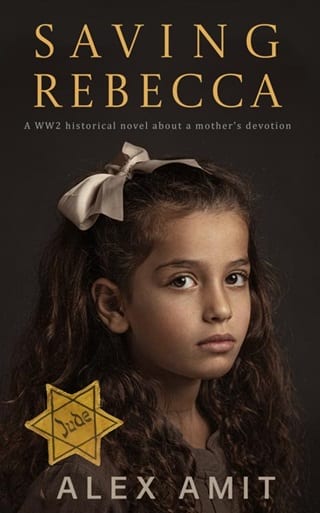12. Auschwitz, Concentration Labor Camp
Chapter twelve
Auschwitz, Concentration Labor Camp
I'm not Sarah Bloch, twenty-nine years old, wife of Erwin Bloch and mother of six-year-old Rebecca. I'm number 132698. My whole identity has been imprinted into these ugly blue digits they tattooed on my arm. If the woman in charge of the block wants to complain about me to the SS, she'll write down this number. If the foreman wants to punish me, he'll use this number. All of us, all the women on the block, are faceless numbers. We're nothing more than thin women with shaved heads, dressed in ragged prison uniforms. We walk slowly in the chilly morning to work at the Weichsel Metall-Union factory that produces explosives and detonators for the German army .
"Faster, lazy pigs," the guard shouts at us in German if she thinks we've slowed down. It's best to walk at the head of the column and in the center, following the foreman leading us along the road to the factory whose chimneys become visible in the light of dawn. Those who walk at the head of the column don't have to run and close in the gaps, and are usually at a safe distance from the sadistic Polish guard's whip.
We walk past the train platform on our way to the camp gate. At the train platform, on the ramp called the Jewish Ramp, there are two long queues, one of men and one of women and children. Every morning, when we pass near the ramp, I try to look for Rebecca among the children standing on the platform. There's little chance that I'll be able to spot her among the crowds. I don't know whether I'd rather notice her or not. There's an SS officer facing the lines in his black uniform, pointing left and then right, splitting the people into groups. Some go right, but most of them go left. I know by now what being on the left means.
"Faster, lazy pigs," the Polish guard menacingly raises her whip, and we try to pick up the pace. My feet ache in the torn and uncomfortable shoes, worn without socks, but I push aside the pain with every step. I focus solely on moving forward.
The sun is already rising over the horizon as we enter the gate of the factory complex outside Auschwitz, passing the synthetic rubber factory and approaching our destination—the explosives factory.
"When they ask you in a few minutes, tell them you used to work in an optics factory, they're looking for skilled women with delicate hands," a prisoner whispered to me the day we arrived, right after the first selection. She ordered us to undress before they shaved our heads and gave us the prisoners' uniforms. She was happy to hear a German speaker among the women and gave me that advice. I decided to trust her and said it when asked. Charlotte was also at the other end of the spacious room. She survived the first selection and was assigned to my work group at the explosives factory. She sleeps on the other side of the block. We haven't spoken since that day in Drancy. Even during the marches to the factory and back, we didn't walk side by side. I miss our nightly conversations.
"Let's move, useless pigs, start working," the foreman whistles shrilly, and we rush to our workstations, replacing the night shift workers. The factory works nonstop in two shifts, twenty-four hours a day, producing ammunition and shells for the German army fighting in Russia. I operate the machine engraving the detonators.
The machines' noise never ceases. I pull the lever and direct the metal blade, etching thin stripes onto the steel block—one after another, and another, and another. I work without thinking about the constant hunger, without thinking about my aching feet, without thinking about my wavy hair being shorn, and without thinking about my daughter. I work like the machine that spits out blocks of metal, carving them repeatedly, ensuring a good job so that the foreman doesn't report me to the SS sergeant. If that happened, my fate would be sealed. At least we get better food rations than the other prisoners, and we're not forced to work outside like most of the men in the labor camps around the Auschwitz main camp.
We have a brief break during the workday for a meal of bread and soup. If the prisoner in charge of pouring the soup likes me, she'll dip the ladle deeper into the pot, and that way, I'll get more peas and maybe even a potato. Then, we resume working until the evening when the night shift arrives, and march back to our block in the women's camp.
"Ugly slow pigs, walk faster," I hear the sadistic Polish guard shouting, then the whip's crack, followed by painful sobs. My body tenses up even though I'm not the one delaying the convoy and feeling the pain. All the women at the head of the column huddle together while walking.
"Sorry," whispers someone who bumped into me.
"It's okay," I whisper back, noticing it's Charlotte. She has lost so much weight since our time in Drancy. I must have lost weight too.
She doesn't say anything other than ‘Sorry' and keeps walking, faintly coughing so as not to attract the attention of the sadistic guard.
"Are you okay?" I whisper to her.
"Yes," she replies, but after a moment, she coughs again and nearly stumbles. I reach out my arm to support her so she doesn't fall. If she stumbles, the whole column will be delayed and the guard will punish her.
"Thank you," she says as we enter the camp and walk along the train platform.
The last rays of the sun illuminate the platform. No one is there. The long freight train is also gone. Only a group of prisoners in striped uniforms collect the belongings of those who had arrived, their possessions scattered on the platform. Several SS soldiers guard them as they work. All around, the lanterns on the electrified wire fences flicker to life, and we enter the women's camp and march to our block .
Without saying a word, Charlotte slowly walks to the wooden bunk she shares with other women at the other end of the block. Is she okay?
I eat dinner, slowly chewing on the slice of bread, and then slip the other slice into my pocket. I'll eat it later if I get really hungry. The women climb into the dense triple wooden bunks. I hear coughing and sighing. What about Charlotte?
I walk across the block, looking for her. In the dim light of the lamp we all look the same, all of us thin, pale, and hairless.
This is not a place for anger and resentment; it's a place and time for compassion.
"Are you all right?" I ask her when I finally find her. I miss talking to her.
"I'm still alive," she replies and tries to smile.
"Maybe you can sleep with me in my bunk?"
"Are you sure?"
"Yes," I nod. She is so weak.
She tries to smile again and gets up from the wooden bunk, follows me to my corner, and we lie down together on the wood. She shivers even though it isn't winter yet.
"I'm sorry we came here," she says after a while.
"I'm glad she didn't come here with us," I reply, even though deep down I know that everyone in Drancy has arrived or will arrive here. It's only a matter of time.
"I'm sure she isn't here," Charlotte whispers. She knows the fate of the children who arrive at this place.
"There must be someone watching over her there in Drancy. There are good people there," I tell her, knowing it isn't true.
"I'm sure of it. I'm sure there's at least one person out there taking care of her. "
"Lights off," the woman in charge of the block announces, and the dim light goes out. Darkness settles in the block, and only the sounds of the women's breathing, coughs, and sighs linger for a few minutes.
I'm not Sarah Bloch, twenty-nine years old, wife of Erwin Bloch and mother of six-year-old Rebecca. I'm number 132698. But in a minute, I'll close my eyes and escape this horrible place to the world of dreams. I'll dream about my Rebecca, about hugging and talking to her. And even though it's unlikely, I wish to believe that she stayed in Drancy and that someone there is watching over her.
 Fullepub
Fullepub 



